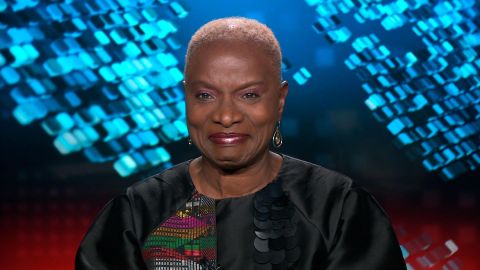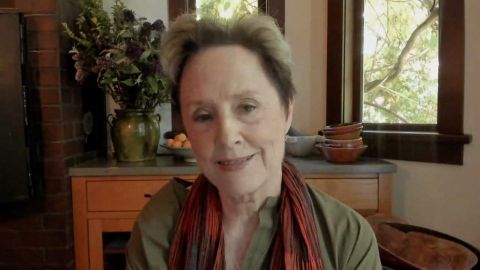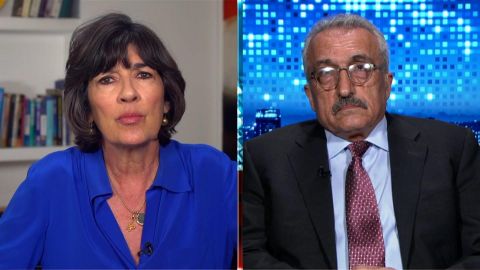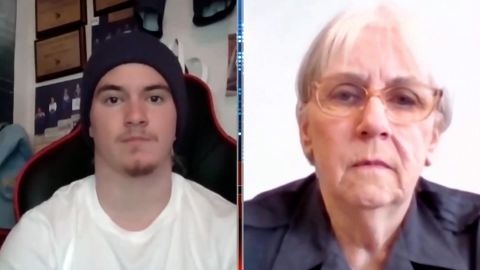Read Transcript EXPAND
CHRISTIANE AMANPOUR:
Well, you have whetted my appetite. Alice Waters, thank you very much indeed. I hope people start more to follow the manifesto.
Thank you so much.
And now we turn to the world of sports and the lives of young transgender athletes. Mack Beggs was a star wrestler at his Texas high school. But
despite living his life as a boy, he was told he had to compete on the girls team.
Mack’s story is just one of several featured in Hulu’s documentary “Changing the Game.”
Here he is with his grandmother, Nancy, who helped raise him, talking to Hari Sreenivasan about their experiences and about the recent wave of anti-
trans legislation in the United States.
HARI SREENIVASAN: Christiane, thanks.
Joining us now, Mack Beggs, and his grandma Nancy.
Thank you both.
I know there’s a lot of people that have not seen the film. So I want to start with just a quick excerpt of the trailer. Let’s take a look.
(BEGIN VIDEO CLIP)
MACK BEGGS, AMERICAN HIGH SCHOOL WRESTLER: Wrestling found me. I love it.
I do train as hard as a man. I fight as hard as a man. I am a man. And I’m the state champ of female high school wrestling.
UNIDENTIFIED FEMALE: Being transgender is not a choice. Would it be fair for me to be competing on the boys team? No. I am a girl. That’s who I am.
UNIDENTIFIED MALE: That has given me some self-worth, self-confidence. They could say whatever they wanted, but, at the end of the day, I’m still
running on the female team.
UNIDENTIFIED FEMALE: That’s so unfair. It’s totally unfair.
UNIDENTIFIED FEMALE: Male biology.
UNIDENTIFIED MALE: Where do you locate that so-called right to be included? They don’t have the right. They’re not girls.
(END VIDEO CLIP)
SREENIVASAN: Mack Beggs, knowing that it was going to be hard, why did you want to wrestle so bad? Why did you want to wrestle, even if it was on the
girls team?
M. BEGGS: I enjoyed it.
I mean, I felt like — I guess it like kind of stems deeper into the fact that it was something that I was used to my whole life, was playing on a
female team. That’s all I ever knew.
And I felt like, if I just quit — I’m not a quitter. And just because this one thing is stopping me from doing the thing that I love, I’m not going to
let it stop me, because I’m going to continue living my life the best way I can to the best of my ability.
And if I have that capability, damn for sure, I’m going to use that.
SREENIVASAN: There was a point in the documentary where you were wrestling boys and you said, I feel like I’m winning but I feel like I’m losing at
the same time. What does that mean?
M. BEGGS: I mean, it is bitter sweet. I mean, to identify as a man and, you know, compete against women. It was really like hard because it is like
I’m enjoying what I am doing as I’m, you know, doing the craft, right? And when you see, at the end of the day, like you’re stepping on the mat with a
girl rather than a guy, you’re not really playing on a team that you’re supposed to be playing on. And it is kind of like — you kind of like have
to shut down in your mind a little and go into to a whole different place.
SREENIVASAN: Nancy, at one point in the film you said that, you know, Mack wasn’t a girl, we made him into a girl. What did you mean by that?
NANCY BEGGS, GRANDMOTHER TO MACK BEGGS: From the time Mack was little, he acted like a boy. He always acted like a boy. He threw his dolls in the
trash. He hated dresses. Keeping one on him was like — we talked about, how are we going to keep him dressed in dresses? And he was going to a
school where he had to wear a little jumper, and he hated that. It was such a fight every day.
And I don’t know if — when he finally came out, it was like, OK, now it makes sense. Because I have never seen a child hate, I was a born tomboy,
but I did not hate the things that Mack did. I did not fight them like he did. And we just — I had never been exposed to transgenderism.
I didn’t know what it was. And I do remember at one point, I don’t know if Mack remembers, when he was in junior high, he came home and we were
talking about it, and this is after he told us that things weren’t right, that he thought he was a boy. And I looked at him and I said, why can’t you
just be gay. What is the problem with this? I don’t understand. I don’t even know what you’re talking about. And —
M. BEGGS: I say, I don’t even know either. But we figured it out together.
SREENIVASAN: You know, one of the things in this film that strikes people is you and Nancy and how you were processing the change. And I want to play
a small clip of that.
(BEGIN VIDEO CLIP)
N. BEGGS: When I look at the pictures of Mack as a little girl, I remember how sweet and we kept thinking, we got a little tomboy on our hands. What
are we going to do? And it just never even — never dreaming that we would ever have to change. It was just always our little tomboy. So, yes. I never
look at them anymore. It is easier to leave them locked up. So, I can see why Mack feels that way too.
This is a picture of Mack. And I know he wants it off the wall so bad, but he won’t say anything because it is the only picture I have of Mack with
long hair. So, I think today I am going to take it off the wall. And put it up with the others. So, I’d like to be a fly on the wall when Mack comes in
and sees it gone.
(END VIDEO CLIP)
SREENIVASAN: Mack, do you have any recollection of walking back home and seeing that last photo gone? What went through your head?
M. BEGGS: The thing was is that I didn’t even know that, I guess, it was down because it got — it was up so much. I was just like, maybe I could
just kind of like walk it out. And then, like I saw the film and she said that, I went back. Like as soon as we got home, I went back to go see where
she took it off. I was like well, she actually did it. Because I actually was asking her for a while and she was like, I guess, just — they finally
did it. I was like, I love you.
SREENIVASAN: Could you empathize with the ideas that your grandmother was expressing here? I mean, she felt basically a loss of a granddaughter. She
gained a grandson, but she felt a loss to a child that she had connected to over the years.
M. BEGGS: Yes. I definitely did think about it. Because like that was like one of the hardest things when coming out was like how like my family was
going to react. I didn’t — I guess I wasn’t afraid in the sense whether they would react wrong or right, I think I was just like scared of every
reaction of any kind. And that was like — kind of like the unknown a little bit.
SREENIVASAN: And, Nancy, in this film, what’s also interesting is, is you talk a little about the struggle that you had with acceptance. You say in
the film, you know, that you are a southern Baptist through and through, you’re a gun toting hardcore Republican.
(BEGIN VIDEO CLIP)
N. BEGGS: I am a deputy sheriff and I work in Dallas. I have been with them 25 years. I was issued a nine-millimeter. So, now I have two nines,
two 40s, two AR-15s.
(END VIDEO CLIP)
SREENIVASAN: But here you are, not afraid to step on some toes when it comes to trans kids.
N. BEGGS: No, I will stomp toes when it comes to trans kids. I don’t have a problem with that. At work, I have a problem with a lot of people having
a bad attitude. And I told them, I said, we can agree to disagree, but this is what my child — my grandson is. He is going to be this way. It is
nonnegotiable. And your opinions, whether they’d be religious or whether they’d be political, don’t really matter to me.
And I did struggle with the religious aspect of it and I did some real in- depth reading in the bible, and God loves us all. He doesn’t care. And he is there for us and we don’t have to make a choice. So, I thought people
have a right to criticize and I don’t have a right to criticize. If this keeps Mack happy and he is — he really in his heart feels this is what he
is, then I accept it without any reservation.
Took a while, but I had been raised in a real strict background.
SREENIVASAN: You know, Nancy, staying with you for a second. You were there at all those wrestling matches. You’re, you know, not quite the stage
mom but you’re the wrestling mom, standing there, banging on the mat, saying, pin him, get it done. And you must have heard the yells and the
taunts from parents in a way that would hurt any parent. What did you tell them? How did you respond to that?
N. BEGGS: I tried not to be in anybody’s face about it because I didn’t want to agitate it. I knew Mack was facing a lot to stay in wrestling at
all because we were getting threats of, you know, we’ll sue, we’ll sue. And I knew what that — having dealt with cases like this, I knew what it could
bring.
So, I tried not to agitate. But if people came to me, I didn’t have a problem telling them my opinion and that they didn’t have to like it, that
was the way it was going to be. He is going to wrestle. He’s going to wrestle girls. If you don’t like it, you need go to your representative and
have them change it so he can wrestle boys.
So, I kind of used it as an enlistment for parents to help us, help us get it changed. If you don’t like it, help us get it changed.
SREENIVASAN: Mack, during that time you were wrestling, one of the more consistent critiques from parents was about your hormone therapies and, you
know, they would immediately say, listen, if my daughter was on steroids, if she was on something else, she would be banned from this. But here’s
this girl who wants to be a boy, who is transitioning.
And, you know, it just seems unfair. And so, if you could help our audience understand, what is the threshold of the types of hormones or therapies
that you were taking and was that an advantage? Was it a disadvantage? What was it there for?
M. BEGGS: I felt like I was on even playing field just because of the fact that I always — when I went to a doctor’s visit, I was like, are my
hormones exceeding in a way that would be disadvantage for a woman or levels of is just women? And we would always have conversations, we’d have
my dose at a low dose, bare minimum, if even minimum in terms of transitioning.
It was just more of like a mental health state of mind that kept me right, like knowing that I could transition through high school. In a way, that’s
like in my head, it helped me. And I just want to make sure I was on an even playing field with this woman. So, a lot of people just think that
because, you know, trans men we take testosterone, they automatically think that’s steroids, and it is not the same thing.
SREENIVASAN: Florida, for example, just the beginning of this month, it became the eighth state this year to ban transgender girls and women in
public secondary schools and colleges from participating on girls and women sport teams. And then, Alabama, the state you’re in, Mack, sent a bill to
the governor barring trans athletes altogether. And they have overwhelmingly passed a bill to make it a felony to provide gender
affirming health care to trans youth. I mean, there’s about 18 other states that have some sorts of bills like this.
So, Mack, I want to ask you, why do you think this is happening and what are you doing about it?
M. BEGGS: The best that I can do is to use my voice as power and through the actions I do every single day, which is helping kids making a platform
for the community to, you know, arise from all these chaos pulled in the country.
And, you know, it just makes me really sad and angry because we’ve had multiple cases of, you know, legislation, trying to provide examples for,
you know, why — how, or and why or how does a transgender have an advantage in sports, and they don’t. It is just, you know, you want to
focus on the transgender individuals that are winning. And as soon as we’re winning, you want to take that away from us.
SREENIVASAN: You know, what do you say to those parents that say, listen, this changes the levels of advantage that people, if gender have any kind
inherent strength difference or speed difference that allowing children to play on teams with the opposite gender isn’t fair. I mean, you’ve heard
that throughout your years now. So, what’s your —
M. BEGGS: Well, I mean, if you want to talk about unfair, I mean, if you want to talk about biological differences being an advantage over one
another, I mean, look at Michael Phelps. He had biological factors that he was born with that made him a better athlete than other, you know, men in
this category. I mean, it just comes down to biology and we are all different not matter male or female.
SREENIVASAN: You talk about the fact that — in the film, that you went through severe bouts of depression. And the statistic is that 4 in 10 trans
athletes contemplate suicide. Did you?
M. BEGGS: Yes, couple times I did. It was really rough. I felt like I couldn’t talk to anybody. It was just — you know, back then. I feel like
now that I do have more worth living for no matter who I am as a person. And that took a lot of growth and a lot of self-care in order to get to
that point.
SREENIVASAN: Nancy, what was that period like? Did you know that he was this sad?
N. BEGGS: Yes. Yes. It was obvious. He — before he started puberty, he was outgoing, he was — seemed happy all the time. When he started to hit
prepuberty, we noticed a difference in his personality. And it concerned me a lot because, in my family, we’ve had a couple of family members that
committed suicide. So, I was aware of what we were looking at, that you don’t just get depressed for nothing, there’s something seriously there.
That’s when we started seeking out counselors.
And some of Mack’s behavior constituted some real serious concern for medical reasons. And we actually sought out behavioral group and put Mack
in it, because we were at our wit’s end. We didn’t want — I did not want and his mother did not want to see him commit suicide. We wanted a happy
kid. And we weren’t sure how to get there because what we were doing didn’t seem to help it. That’s the times that he was going through getting on the
computer. He was learning about transgenderism. We didn’t. We had no idea what he was doing.
And teenagers, as you know, have a tendency not to come to the parents, they go to other kids for advice. And I was concerned that he was getting
the wrong advice. And we wanted to make sure he got the right advice. And I think it’s when he went through this clinic that it came out that he was
unhappy because he felt like he was in the wrong body.
SREENIVASAN: Mack, what do you hope people get from watching this film?
M. BEGGS: I hope they, you know, get a firm understanding that we are here and we have always been here. And I just — that there needs to be more
love and acceptance because with that, that’s when you start seeing like true happiness and, you know, acceptance goes a long way.
SREENIVASAN: The film called “Changing the Game.” Mack Beggs, and his grandma, Nancy, thanks to you both.
N. BEGGS: Thank you for having us.
M. BEGGS: Thank you.
About This Episode EXPAND
Abbas Milani; Alice Waters; Mack Beggs and Nancy Beggs; Angélique Kidjo
LEARN MORE



